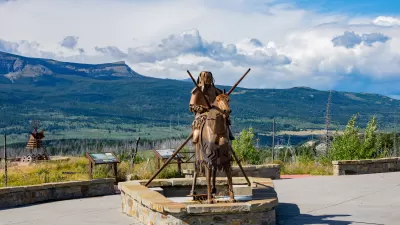Newly obtained documents reveal the extent of the state's efforts to strip protections from federal lands around the United States.

Pacific Standard's Jimmy Tobias reports on new insights into the depth of Utah's "anti-public lands agenda."
A 2016 document recently obtained from Governor Herbert's Public Lands Policy Coordinating Office outlines 15 pages of "top objectives" for federal lands, primarily falling under one broad category: deregulation. That document was apparently part of a "master list" of similar objectives being compiled by a conservative think tank to influence policymakers, Tobias writes, noting the influence wielded by conservative Utahn lawmakers in the arena of federal land regulations.
"Utah Congressman Rob Bishop is chair of the House Natural Resources Committee, a position from which he regularly inveighs against conservation laws like the Endangered Species Act, the Antiquities Act, and the Wilderness Act. Then there's Utah Senator Orrin Hatch, who was a key player in convincing President Donald Trump to review and ultimately roll back some national monument designations in the American West. Utah's other senator, Mike Lee, is in the mix too. He recently likened federal lands to the "royal forests" of European kings and called for their effective abolition."
That influence is particularly important, Tobias stresses, because many of the proposals in the document look beyond state borders to impact federal lands across the entire country.
"Among other things, the document … proposes the rollback of a suite of land, wildlife, and climate protections, including the Obama administration's now-defunct moratorium on new federal land coal leasing. And it calls on Congress to amend laws like the Federal Land Policy and Management Act and the National Environmental Policy Act to give states much greater control over federal land management."
FULL STORY: INSIDE UTAH'S ANTI-PUBLIC LANDS AGENDA

Study: Maui’s Plan to Convert Vacation Rentals to Long-Term Housing Could Cause Nearly $1 Billion Economic Loss
The plan would reduce visitor accommodation by 25,% resulting in 1,900 jobs lost.

North Texas Transit Leaders Tout Benefits of TOD for Growing Region
At a summit focused on transit-oriented development, policymakers discussed how North Texas’ expanded light rail system can serve as a tool for economic growth.

Why Should We Subsidize Public Transportation?
Many public transit agencies face financial stress due to rising costs, declining fare revenue, and declining subsidies. Transit advocates must provide a strong business case for increasing public transit funding.

How to Make US Trains Faster
Changes to boarding platforms and a switch to electric trains could improve U.S. passenger rail service without the added cost of high-speed rail.

Columbia’s Revitalized ‘Loop’ Is a Hub for Local Entrepreneurs
A focus on small businesses is helping a commercial corridor in Columbia, Missouri thrive.

Invasive Insect Threatens Minnesota’s Ash Forests
The Emerald Ash Borer is a rapidly spreading invasive pest threatening Minnesota’s ash trees, and homeowners are encouraged to plant diverse replacement species, avoid moving ash firewood, and monitor for signs of infestation.
Urban Design for Planners 1: Software Tools
This six-course series explores essential urban design concepts using open source software and equips planners with the tools they need to participate fully in the urban design process.
Planning for Universal Design
Learn the tools for implementing Universal Design in planning regulations.
City of Santa Clarita
Ascent Environmental
Institute for Housing and Urban Development Studies (IHS)
City of Grandview
Harvard GSD Executive Education
Toledo-Lucas County Plan Commissions
Salt Lake City
NYU Wagner Graduate School of Public Service





























